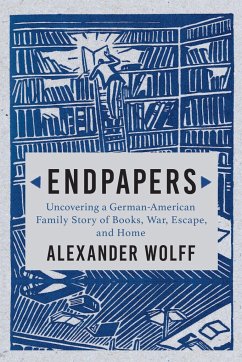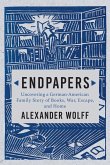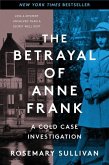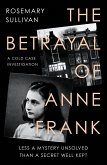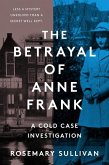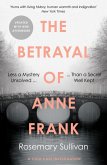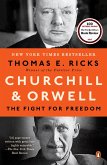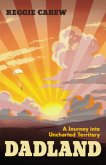A sweeping portrait of the turmoil of the twentieth century and the legacy of immigration, as seen through the German-American family of the celebrated book publisher Kurt Wolff
A literary gem researched over a year the author spent living in Berlin, Endpapers excavates the extraordinary histories of the author's grandfather and father: the renowned publisher Kurt Wolff, dubbed "perhaps the twentieth century's most discriminating publisher" by the New York Times Book Review, and his son Niko, who fought in the Wehrmacht during World War II before coming to America.
Kurt Wolff was born in Bonn into a highly cultured German-Jewish family, whose ancestors included converts to Christianity, among them Baron Moritz von Haber, whose desire to demand satisfaction in a duel sparked off bloody antisemitic riots. Always bookish, Kurt became a publisher at twenty-three, setting up his own firm and publishing Franz Kafka, Joseph Roth, Karl Kraus, and many other authors whose books would soon be burned by the Nazis. Fleeing Germany in 1933, a day after the Reichstag fire, Kurt and his second wife, Helen, sought refuge in France, Italy, and ultimately New York, where in a small Greenwich Village apartment they founded Pantheon Books. Pantheon would soon take its own place in literary history with the publication of Nobel laureate Boris Pasternak's novel Doctor Zhivago, and as the conduit that brought major European works to the States. But Kurt's taciturn son Niko, offspring of his first marriage to Elisabeth Merck, was left behind in Germany, where despite his Jewish heritage he served the Nazis on two fronts. As Alexander Wolff visits dusty archives and meets distant relatives, he discovers secrets that never made it to the land of fresh starts, including the connection between Hitler and the family pharmaceutical firm E. Merck, and the story of a half-brother Niko never knew.
With surprising revelations from never-before-published family letters, diaries, and photographs, Endpapers is a moving and intimate family story, weaving a literary tapestry of the perils, triumphs, and secrets of history and exile.
A literary gem researched over a year the author spent living in Berlin, Endpapers excavates the extraordinary histories of the author's grandfather and father: the renowned publisher Kurt Wolff, dubbed "perhaps the twentieth century's most discriminating publisher" by the New York Times Book Review, and his son Niko, who fought in the Wehrmacht during World War II before coming to America.
Kurt Wolff was born in Bonn into a highly cultured German-Jewish family, whose ancestors included converts to Christianity, among them Baron Moritz von Haber, whose desire to demand satisfaction in a duel sparked off bloody antisemitic riots. Always bookish, Kurt became a publisher at twenty-three, setting up his own firm and publishing Franz Kafka, Joseph Roth, Karl Kraus, and many other authors whose books would soon be burned by the Nazis. Fleeing Germany in 1933, a day after the Reichstag fire, Kurt and his second wife, Helen, sought refuge in France, Italy, and ultimately New York, where in a small Greenwich Village apartment they founded Pantheon Books. Pantheon would soon take its own place in literary history with the publication of Nobel laureate Boris Pasternak's novel Doctor Zhivago, and as the conduit that brought major European works to the States. But Kurt's taciturn son Niko, offspring of his first marriage to Elisabeth Merck, was left behind in Germany, where despite his Jewish heritage he served the Nazis on two fronts. As Alexander Wolff visits dusty archives and meets distant relatives, he discovers secrets that never made it to the land of fresh starts, including the connection between Hitler and the family pharmaceutical firm E. Merck, and the story of a half-brother Niko never knew.
With surprising revelations from never-before-published family letters, diaries, and photographs, Endpapers is a moving and intimate family story, weaving a literary tapestry of the perils, triumphs, and secrets of history and exile.
Praise for Endpapers:
Named a Best Nonfiction Book of the Year by the Washington Post
An Amazon Best Book of the Month (History)
"An event-filled biography and, along the way, a captivating case study in the challenges faced by refugees attempting to remake a life . . . Part of Mr. Wolff's chronicle has to do with the family lineage of which he is a part, not least the experience of his own father, Kurt's son Niko . . . Not content with registering the tectonic shifts of the times, [Kurt] Wolff brought about convulsions of his own, shaking up the American postwar literary scene. His grandson's book, as enlightening as it is engaging, measures the effects." -Benjamin Balint, Wall Street Journal
"Wolff powerfully uses the present to lace together the biographies of his father and paternal grandfather . . . If war, exile, geographical distance, American myopia, and the comforts of upper-middle class life separated the three generations, Wolff's book attempts to bring them together. In the spirit of Vergangenheitsaufarbeitung, the work of confronting the past undertaken by generations of post-war Germans, Wolff uses his skills as a reporter to sift through reams of correspondences, journals, archives, and interviews to expose the darkest parts of his family's history . . . Ultimately the real energy of Endpapers comes not from Wolff's impressive reconstruction of his father and grandfather's biographies, but from the way he adds himself to the narrative, bringing us back to the present, to Merkel and Trump, to the stumbling stones in Berlin that mark a victim of the Nazis, to questions of his own privilege. Endpapers is more than a book of history; it's a transnational, intergenerational reckoning." -Shuchi Saraswat, Boston Globe
"Wolff explores the lives and history of his father and great-grandfather, the distinguished founder of Pantheon Books. As books were being burned and banned by the Nazis, Kurt Wolff escaped from Germany and ended up in New York, by way of France, where he began the still-flourishing publishing house. Drawing upon extensive family documents, Endpapers is as riveting as the fiction the Wolffs themselves have published, and deeply affecting." -Newsweek
"Revelatory, riveting, and deeply moving . . . The question of German guilt, both individual and collective, continues to haunt Alexander Wolff as he dives deeper into his family history . . . Wolff lands back in America in July 2018, midway through the Trump years, amid a surge of homegrown nativism and bigotry. It is a reminder of the forces that his father and grandfather confronted in much darker times, and of the fragility of even the most stable and democratic societies." -Joshua Hammer, New York Review of Books
"Alexander Wolff is keen, after a generation of silence, to follow the untold stories wherever they might lead." -Claire Messud, Harper's Magazine
"Endpapers zigzags through a lot of territory. Wolff's journalistic skills and meticulous, stubborn research have opened up fascinating historical veins surrounding and preceding his progenitors . . . An invaluable gift to literature, mainly but not only for the quotations, details, and beguilingly written scenes of Kurt Wolff's life scattered throughout, between and betwixt accounts of other family members and ancestors . . . Alexander Wolff set out in retirement eager to capture all the information he could about his family, and in the process to finally understand Germany. Shaping an enormous amount of source material into a fluently written and footnoted 360-page volume, he's reached one goal, and generously shared with readers the journey toward another." -Kai Maristed, Arts Fuse
"Excellent . . . The diligent reader will be rewarded by a panorama of the modern history which connects America and Germany from two wars to the present day . . . This book should appeal to any reader willing to examine the tendrils of guilt attached to any individual by the ghosts of his family's past." -J. Kemper Cambell, Lincoln Journal Star
"Compelling . . . Unflinching . . . Now, having looked more deeply into that Germanness, the author is left with layers of ambiguities . . . In contemporary Berlin, where the Nazis' victims are memorialized in the very pavement, Alexander Wolff exposes in his ancestors' experiences the common thread. It is the barest, most basic definition of purpose in life, neither noble nor subhuman: survival." -Robert Siegel, Moment Magazine
"Wolff delivers a poignant portrait of his grandfather, Pantheon Books founder Kurt Wolff, and his own father, Niko Wolff . . . Wolff skillfully contextualizes his father and grandfather's tales with military and political history . . . History buffs and literary enthusiasts will be rewarded." -Publishers Weekly
"The descendent of a prominent publisher who fled the Nazis and a Wehrmacht soldier who didn't investigates his family's history and discovers a tapestry of exile and complicity . . . Wolff reveals a broader fascination with the relationship between historical events and personal trajectories and concern that the charged environment that defined Kurt's and Niko's choices is being replicated in the U.S. today." -Booklist
"The author delves deeply into his ancestry to unravel the complex stories of his multigenerational family, and to show how his father's and grandfather's traumatic lives affected him . . . Will grasp the attention of readers interested in the Holocaust and modern German history." -Library Journal
"A powerfully told story of family, honor, love, and truth, by a masterful writer who sees across the oceans, through the generations, and beyond our immediate politics to share with us what is timeless and true in the immigrant's journey. In Endpapers we see the Wolff family through war and love, detention camps and immigration hearings, feast and famine, kindness and betrayal, occupying a world equal parts Casablanca and Kafka. This engrossing and entertaining book takes us across the Atlantic and through the last century to reckon with the full, true story of a shared family past. It is a powerful book of conscience, of remembrance, of love and loss and new beginnings that never quite lose hold of the past. In a powerful and personal way this book reminds us that we are all connected. Endpapers tells the beautiful truth that so often those who contribute most to the culture and civic life of a place are the outcast and the refugee. It is a personal invocation of the power of citizenship, of what happens to a civilization when we fail our civic purpose and what becomes possible when we rise to it. The beautiful and haunting stories told in this book transcend policy and politics. An amazing and timely book, which is also a joy to read." -Former U.S. Representative Beto O'Rourke of Texas
"No serious reader will be less than wowed by Alexander Wolff's Endpapers. The author, constructing a fascinating story of family, comes to grips with three different lives: his grandfather's, publisher Kurt Wolff; Niko's, a reluctant soldier in WWII; and Wolff's own, interwoven with the others. Endpapers is a personal history that serves the public well." -Laura Claridge, author of The Lady with the Borzoi
"Alexander Wolff-a writer of superb grace-traces a complex and compelling family history. His grandfather, the famous Kurt Wolff, was among the cultural titans of Germany in the early twentieth century, publishing the likes of Kafka, Joseph Roth, Karl Kraus and Heinrich Mann before moving, ultimately, to New York, where he established another major press. His own father (despite his Jewish roots) served in Hitler's army before immigrating to the States. Determined to excavate his family's often elusive past, Wolff moved to Berlin for a year with his wife and children. The result is this deeply absorbing narrative of high culture under threat, of political and moral violence, and the deep wish for what Wolff refers to as Heimkehr or 'homecoming.' Endpapers held me in its spell for days." -Jay Parini, author of Borges and Me: An Encounter
"A stunning and brave book, deep and absorbing. I was enraptured by the story of Kurt, Niko, and Alex as they moved through the crosswinds of the twentieth century, from Munich to Princeton, and into the modern world." -David Maraniss, author of A Good American Family: The Red Scare and My Father
"Thomas Mann and Bertolt Brecht, the two greatest émigré writers, both fled America. So did the greatest of émigré publishers, Kurt Wolff, universally regarded as the class act of his industry. In a compelling, frequently thrilling, and-if you have an ear for the biting tone of Hitler's exiles-often hilarious book, Alexander Wolff combines biography, memoir, and cultural history, rendering them indivisible, and making clear the uncanny and terrifying parallels between Kurt Wolff's day and ours." -Anthony Heilbut, author of Exiled in Paradise and Thomas Mann: Eros and Literature
"Meticulously researched and beautifully written, Endpapers, at its heart, is an absorbing family history. But it is so much more than that, it is a haunting exploration of guilt and responsibility, of roots and new beginnings. Filled with stunning literary details that any bibliophile will cherish, this is an intimate and complex portrait of a remarkable family that also tells a wider story of Europe and America in the twentieth century. Endpapers is a treasure-a brave and moving book." -Ariana Neumann, author of When Time Stopped: A Memoir of My Father's War and What Remains
"Remarkable lives in extraordinary times-a gripping and exceptional literary journey." -Philippe Sands, author of The Ratline: Love, Lies and Justice on the Trail of a Nazi Fugitive
"An astonishing, compelling, confronting story of a divided family, reaching sharply into the present." -Tim Bonyhady, author of Good Living Street: Portrait of a Patron Family, Vienna 1900
Praise for Alexander Wolff:
"A highly informed and fascinating look at the intersection of sports and politics that led me to unexpected realizations about Obama, the presidency, and the world of basketball. Smart and fun." -Gerald Early, Merle Kling Professor of Modern Letters, Washington University in St. Louis, on The Audacity of Hoop
"In a class by itself." -Huffington Post, on The Audacity of Hoop
"Wolff's knack for finding fascinating people to interview goes far in humanizing basketball in a global context." -Library Journal, on Big Game, Small World
Named a Best Nonfiction Book of the Year by the Washington Post
An Amazon Best Book of the Month (History)
"An event-filled biography and, along the way, a captivating case study in the challenges faced by refugees attempting to remake a life . . . Part of Mr. Wolff's chronicle has to do with the family lineage of which he is a part, not least the experience of his own father, Kurt's son Niko . . . Not content with registering the tectonic shifts of the times, [Kurt] Wolff brought about convulsions of his own, shaking up the American postwar literary scene. His grandson's book, as enlightening as it is engaging, measures the effects." -Benjamin Balint, Wall Street Journal
"Wolff powerfully uses the present to lace together the biographies of his father and paternal grandfather . . . If war, exile, geographical distance, American myopia, and the comforts of upper-middle class life separated the three generations, Wolff's book attempts to bring them together. In the spirit of Vergangenheitsaufarbeitung, the work of confronting the past undertaken by generations of post-war Germans, Wolff uses his skills as a reporter to sift through reams of correspondences, journals, archives, and interviews to expose the darkest parts of his family's history . . . Ultimately the real energy of Endpapers comes not from Wolff's impressive reconstruction of his father and grandfather's biographies, but from the way he adds himself to the narrative, bringing us back to the present, to Merkel and Trump, to the stumbling stones in Berlin that mark a victim of the Nazis, to questions of his own privilege. Endpapers is more than a book of history; it's a transnational, intergenerational reckoning." -Shuchi Saraswat, Boston Globe
"Wolff explores the lives and history of his father and great-grandfather, the distinguished founder of Pantheon Books. As books were being burned and banned by the Nazis, Kurt Wolff escaped from Germany and ended up in New York, by way of France, where he began the still-flourishing publishing house. Drawing upon extensive family documents, Endpapers is as riveting as the fiction the Wolffs themselves have published, and deeply affecting." -Newsweek
"Revelatory, riveting, and deeply moving . . . The question of German guilt, both individual and collective, continues to haunt Alexander Wolff as he dives deeper into his family history . . . Wolff lands back in America in July 2018, midway through the Trump years, amid a surge of homegrown nativism and bigotry. It is a reminder of the forces that his father and grandfather confronted in much darker times, and of the fragility of even the most stable and democratic societies." -Joshua Hammer, New York Review of Books
"Alexander Wolff is keen, after a generation of silence, to follow the untold stories wherever they might lead." -Claire Messud, Harper's Magazine
"Endpapers zigzags through a lot of territory. Wolff's journalistic skills and meticulous, stubborn research have opened up fascinating historical veins surrounding and preceding his progenitors . . . An invaluable gift to literature, mainly but not only for the quotations, details, and beguilingly written scenes of Kurt Wolff's life scattered throughout, between and betwixt accounts of other family members and ancestors . . . Alexander Wolff set out in retirement eager to capture all the information he could about his family, and in the process to finally understand Germany. Shaping an enormous amount of source material into a fluently written and footnoted 360-page volume, he's reached one goal, and generously shared with readers the journey toward another." -Kai Maristed, Arts Fuse
"Excellent . . . The diligent reader will be rewarded by a panorama of the modern history which connects America and Germany from two wars to the present day . . . This book should appeal to any reader willing to examine the tendrils of guilt attached to any individual by the ghosts of his family's past." -J. Kemper Cambell, Lincoln Journal Star
"Compelling . . . Unflinching . . . Now, having looked more deeply into that Germanness, the author is left with layers of ambiguities . . . In contemporary Berlin, where the Nazis' victims are memorialized in the very pavement, Alexander Wolff exposes in his ancestors' experiences the common thread. It is the barest, most basic definition of purpose in life, neither noble nor subhuman: survival." -Robert Siegel, Moment Magazine
"Wolff delivers a poignant portrait of his grandfather, Pantheon Books founder Kurt Wolff, and his own father, Niko Wolff . . . Wolff skillfully contextualizes his father and grandfather's tales with military and political history . . . History buffs and literary enthusiasts will be rewarded." -Publishers Weekly
"The descendent of a prominent publisher who fled the Nazis and a Wehrmacht soldier who didn't investigates his family's history and discovers a tapestry of exile and complicity . . . Wolff reveals a broader fascination with the relationship between historical events and personal trajectories and concern that the charged environment that defined Kurt's and Niko's choices is being replicated in the U.S. today." -Booklist
"The author delves deeply into his ancestry to unravel the complex stories of his multigenerational family, and to show how his father's and grandfather's traumatic lives affected him . . . Will grasp the attention of readers interested in the Holocaust and modern German history." -Library Journal
"A powerfully told story of family, honor, love, and truth, by a masterful writer who sees across the oceans, through the generations, and beyond our immediate politics to share with us what is timeless and true in the immigrant's journey. In Endpapers we see the Wolff family through war and love, detention camps and immigration hearings, feast and famine, kindness and betrayal, occupying a world equal parts Casablanca and Kafka. This engrossing and entertaining book takes us across the Atlantic and through the last century to reckon with the full, true story of a shared family past. It is a powerful book of conscience, of remembrance, of love and loss and new beginnings that never quite lose hold of the past. In a powerful and personal way this book reminds us that we are all connected. Endpapers tells the beautiful truth that so often those who contribute most to the culture and civic life of a place are the outcast and the refugee. It is a personal invocation of the power of citizenship, of what happens to a civilization when we fail our civic purpose and what becomes possible when we rise to it. The beautiful and haunting stories told in this book transcend policy and politics. An amazing and timely book, which is also a joy to read." -Former U.S. Representative Beto O'Rourke of Texas
"No serious reader will be less than wowed by Alexander Wolff's Endpapers. The author, constructing a fascinating story of family, comes to grips with three different lives: his grandfather's, publisher Kurt Wolff; Niko's, a reluctant soldier in WWII; and Wolff's own, interwoven with the others. Endpapers is a personal history that serves the public well." -Laura Claridge, author of The Lady with the Borzoi
"Alexander Wolff-a writer of superb grace-traces a complex and compelling family history. His grandfather, the famous Kurt Wolff, was among the cultural titans of Germany in the early twentieth century, publishing the likes of Kafka, Joseph Roth, Karl Kraus and Heinrich Mann before moving, ultimately, to New York, where he established another major press. His own father (despite his Jewish roots) served in Hitler's army before immigrating to the States. Determined to excavate his family's often elusive past, Wolff moved to Berlin for a year with his wife and children. The result is this deeply absorbing narrative of high culture under threat, of political and moral violence, and the deep wish for what Wolff refers to as Heimkehr or 'homecoming.' Endpapers held me in its spell for days." -Jay Parini, author of Borges and Me: An Encounter
"A stunning and brave book, deep and absorbing. I was enraptured by the story of Kurt, Niko, and Alex as they moved through the crosswinds of the twentieth century, from Munich to Princeton, and into the modern world." -David Maraniss, author of A Good American Family: The Red Scare and My Father
"Thomas Mann and Bertolt Brecht, the two greatest émigré writers, both fled America. So did the greatest of émigré publishers, Kurt Wolff, universally regarded as the class act of his industry. In a compelling, frequently thrilling, and-if you have an ear for the biting tone of Hitler's exiles-often hilarious book, Alexander Wolff combines biography, memoir, and cultural history, rendering them indivisible, and making clear the uncanny and terrifying parallels between Kurt Wolff's day and ours." -Anthony Heilbut, author of Exiled in Paradise and Thomas Mann: Eros and Literature
"Meticulously researched and beautifully written, Endpapers, at its heart, is an absorbing family history. But it is so much more than that, it is a haunting exploration of guilt and responsibility, of roots and new beginnings. Filled with stunning literary details that any bibliophile will cherish, this is an intimate and complex portrait of a remarkable family that also tells a wider story of Europe and America in the twentieth century. Endpapers is a treasure-a brave and moving book." -Ariana Neumann, author of When Time Stopped: A Memoir of My Father's War and What Remains
"Remarkable lives in extraordinary times-a gripping and exceptional literary journey." -Philippe Sands, author of The Ratline: Love, Lies and Justice on the Trail of a Nazi Fugitive
"An astonishing, compelling, confronting story of a divided family, reaching sharply into the present." -Tim Bonyhady, author of Good Living Street: Portrait of a Patron Family, Vienna 1900
Praise for Alexander Wolff:
"A highly informed and fascinating look at the intersection of sports and politics that led me to unexpected realizations about Obama, the presidency, and the world of basketball. Smart and fun." -Gerald Early, Merle Kling Professor of Modern Letters, Washington University in St. Louis, on The Audacity of Hoop
"In a class by itself." -Huffington Post, on The Audacity of Hoop
"Wolff's knack for finding fascinating people to interview goes far in humanizing basketball in a global context." -Library Journal, on Big Game, Small World

